Contemporary Issues in Social & Health Care: Leadership Essay
VerifiedAdded on 2022/08/14
|8
|3036
|12
Essay
AI Summary
This essay discusses contemporary issues in social and health care, emphasizing the importance of sociological theories in understanding the relationship between health, healthcare professionals, and the public. It explores how global contexts, cultural factors, and economic/political situations impact health issues, particularly focusing on sexually transmitted infections. The essay also examines the consequences of illness, including disabilities, mental health disorders, and the impact on family members. It further analyzes sociological theories such as Functionalism, Conflict Theory, and Interactionism, highlighting their advantages and disadvantages in addressing health-related problems. The importance of the doctor-patient relationship and the impact of life-changing illnesses on individuals are also discussed, supported by demographic data on STIs in the United Kingdom. The essay concludes by advocating for awareness and proactive measures to reduce the incidence of such health issues.
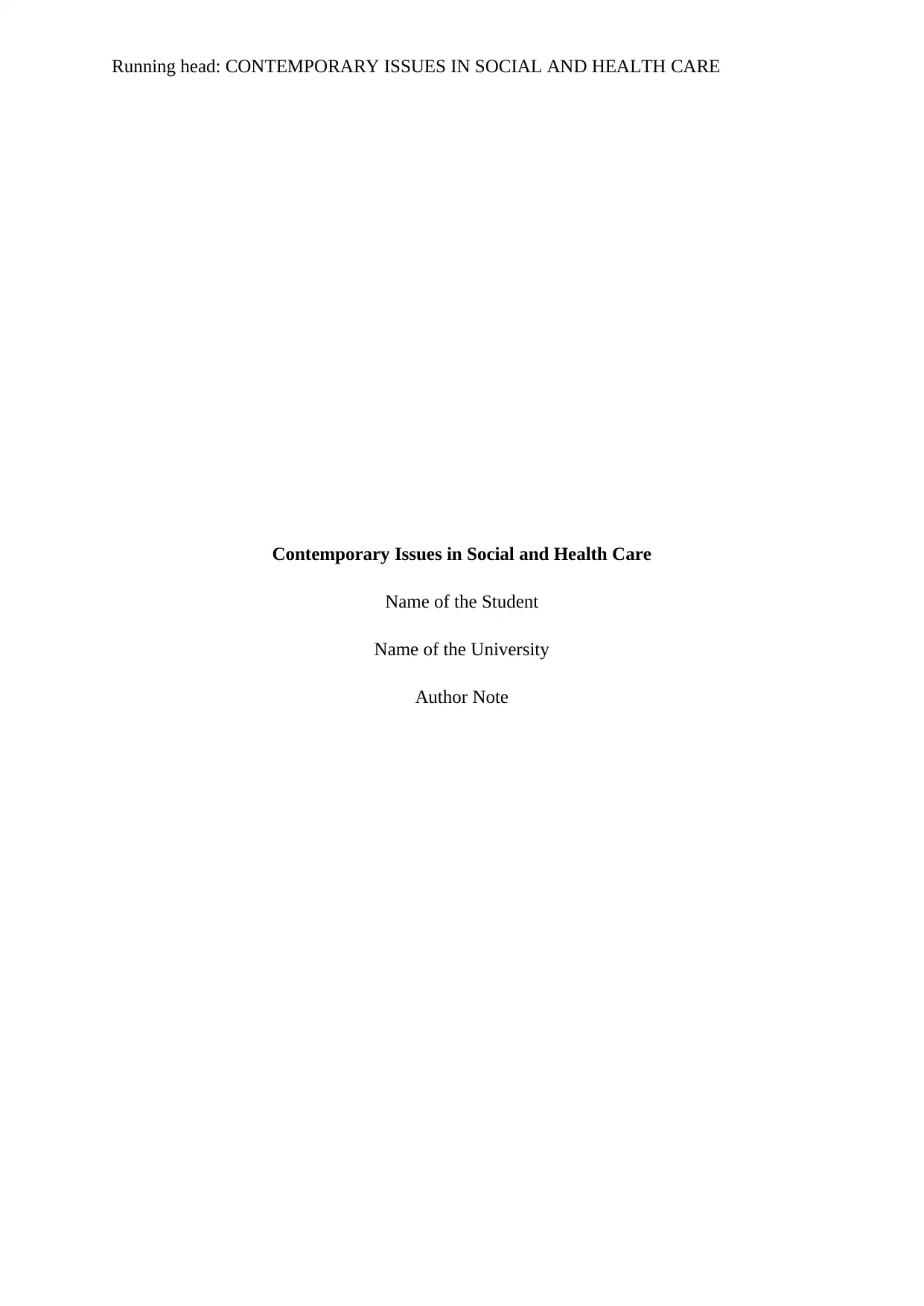
Running head: CONTEMPORARY ISSUES IN SOCIAL AND HEALTH CARE
Contemporary Issues in Social and Health Care
Name of the Student
Name of the University
Author Note
Contemporary Issues in Social and Health Care
Name of the Student
Name of the University
Author Note
Paraphrase This Document
Need a fresh take? Get an instant paraphrase of this document with our AI Paraphraser
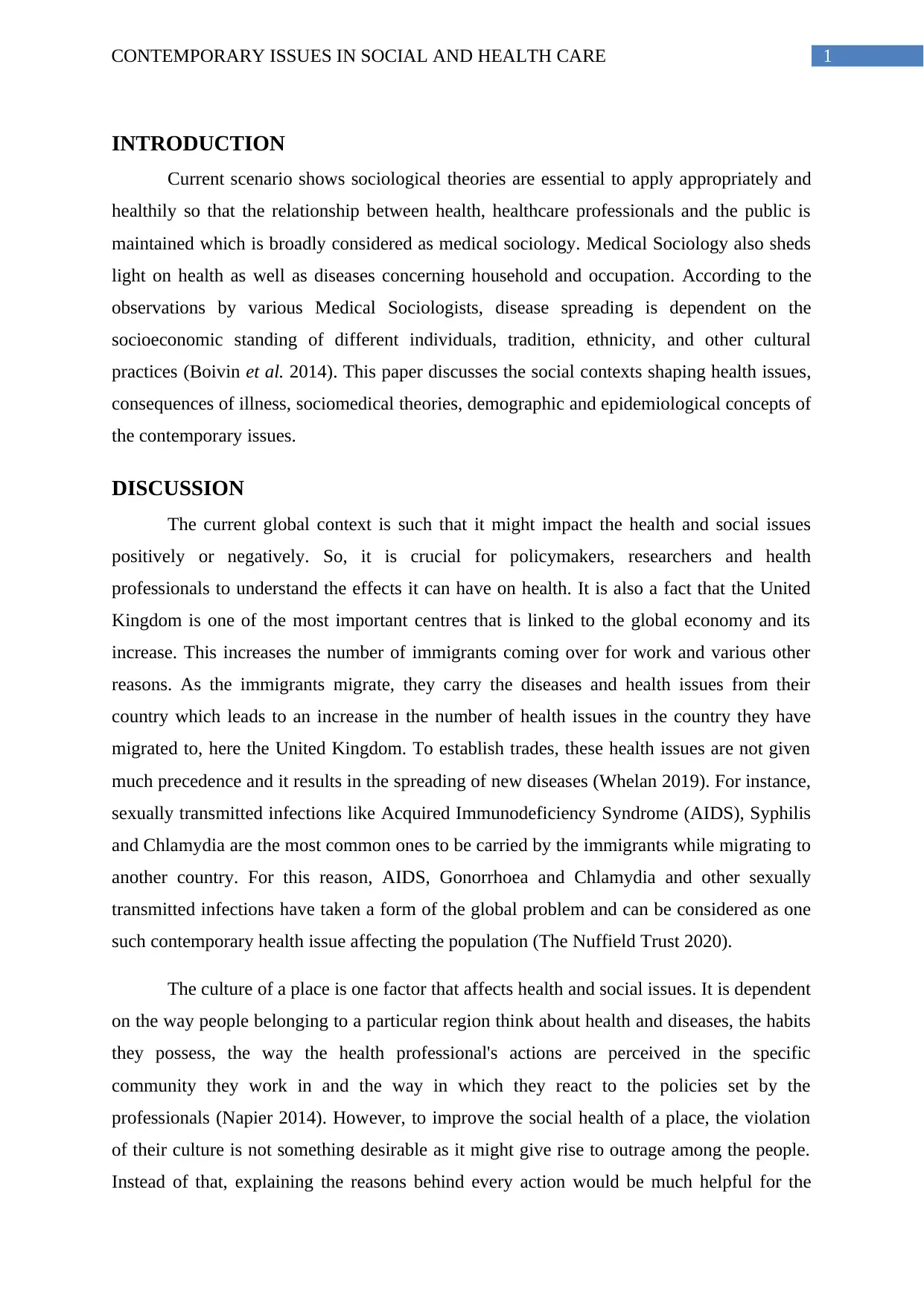
1CONTEMPORARY ISSUES IN SOCIAL AND HEALTH CARE
INTRODUCTION
Current scenario shows sociological theories are essential to apply appropriately and
healthily so that the relationship between health, healthcare professionals and the public is
maintained which is broadly considered as medical sociology. Medical Sociology also sheds
light on health as well as diseases concerning household and occupation. According to the
observations by various Medical Sociologists, disease spreading is dependent on the
socioeconomic standing of different individuals, tradition, ethnicity, and other cultural
practices (Boivin et al. 2014). This paper discusses the social contexts shaping health issues,
consequences of illness, sociomedical theories, demographic and epidemiological concepts of
the contemporary issues.
DISCUSSION
The current global context is such that it might impact the health and social issues
positively or negatively. So, it is crucial for policymakers, researchers and health
professionals to understand the effects it can have on health. It is also a fact that the United
Kingdom is one of the most important centres that is linked to the global economy and its
increase. This increases the number of immigrants coming over for work and various other
reasons. As the immigrants migrate, they carry the diseases and health issues from their
country which leads to an increase in the number of health issues in the country they have
migrated to, here the United Kingdom. To establish trades, these health issues are not given
much precedence and it results in the spreading of new diseases (Whelan 2019). For instance,
sexually transmitted infections like Acquired Immunodeficiency Syndrome (AIDS), Syphilis
and Chlamydia are the most common ones to be carried by the immigrants while migrating to
another country. For this reason, AIDS, Gonorrhoea and Chlamydia and other sexually
transmitted infections have taken a form of the global problem and can be considered as one
such contemporary health issue affecting the population (The Nuffield Trust 2020).
The culture of a place is one factor that affects health and social issues. It is dependent
on the way people belonging to a particular region think about health and diseases, the habits
they possess, the way the health professional's actions are perceived in the specific
community they work in and the way in which they react to the policies set by the
professionals (Napier 2014). However, to improve the social health of a place, the violation
of their culture is not something desirable as it might give rise to outrage among the people.
Instead of that, explaining the reasons behind every action would be much helpful for the
INTRODUCTION
Current scenario shows sociological theories are essential to apply appropriately and
healthily so that the relationship between health, healthcare professionals and the public is
maintained which is broadly considered as medical sociology. Medical Sociology also sheds
light on health as well as diseases concerning household and occupation. According to the
observations by various Medical Sociologists, disease spreading is dependent on the
socioeconomic standing of different individuals, tradition, ethnicity, and other cultural
practices (Boivin et al. 2014). This paper discusses the social contexts shaping health issues,
consequences of illness, sociomedical theories, demographic and epidemiological concepts of
the contemporary issues.
DISCUSSION
The current global context is such that it might impact the health and social issues
positively or negatively. So, it is crucial for policymakers, researchers and health
professionals to understand the effects it can have on health. It is also a fact that the United
Kingdom is one of the most important centres that is linked to the global economy and its
increase. This increases the number of immigrants coming over for work and various other
reasons. As the immigrants migrate, they carry the diseases and health issues from their
country which leads to an increase in the number of health issues in the country they have
migrated to, here the United Kingdom. To establish trades, these health issues are not given
much precedence and it results in the spreading of new diseases (Whelan 2019). For instance,
sexually transmitted infections like Acquired Immunodeficiency Syndrome (AIDS), Syphilis
and Chlamydia are the most common ones to be carried by the immigrants while migrating to
another country. For this reason, AIDS, Gonorrhoea and Chlamydia and other sexually
transmitted infections have taken a form of the global problem and can be considered as one
such contemporary health issue affecting the population (The Nuffield Trust 2020).
The culture of a place is one factor that affects health and social issues. It is dependent
on the way people belonging to a particular region think about health and diseases, the habits
they possess, the way the health professional's actions are perceived in the specific
community they work in and the way in which they react to the policies set by the
professionals (Napier 2014). However, to improve the social health of a place, the violation
of their culture is not something desirable as it might give rise to outrage among the people.
Instead of that, explaining the reasons behind every action would be much helpful for the
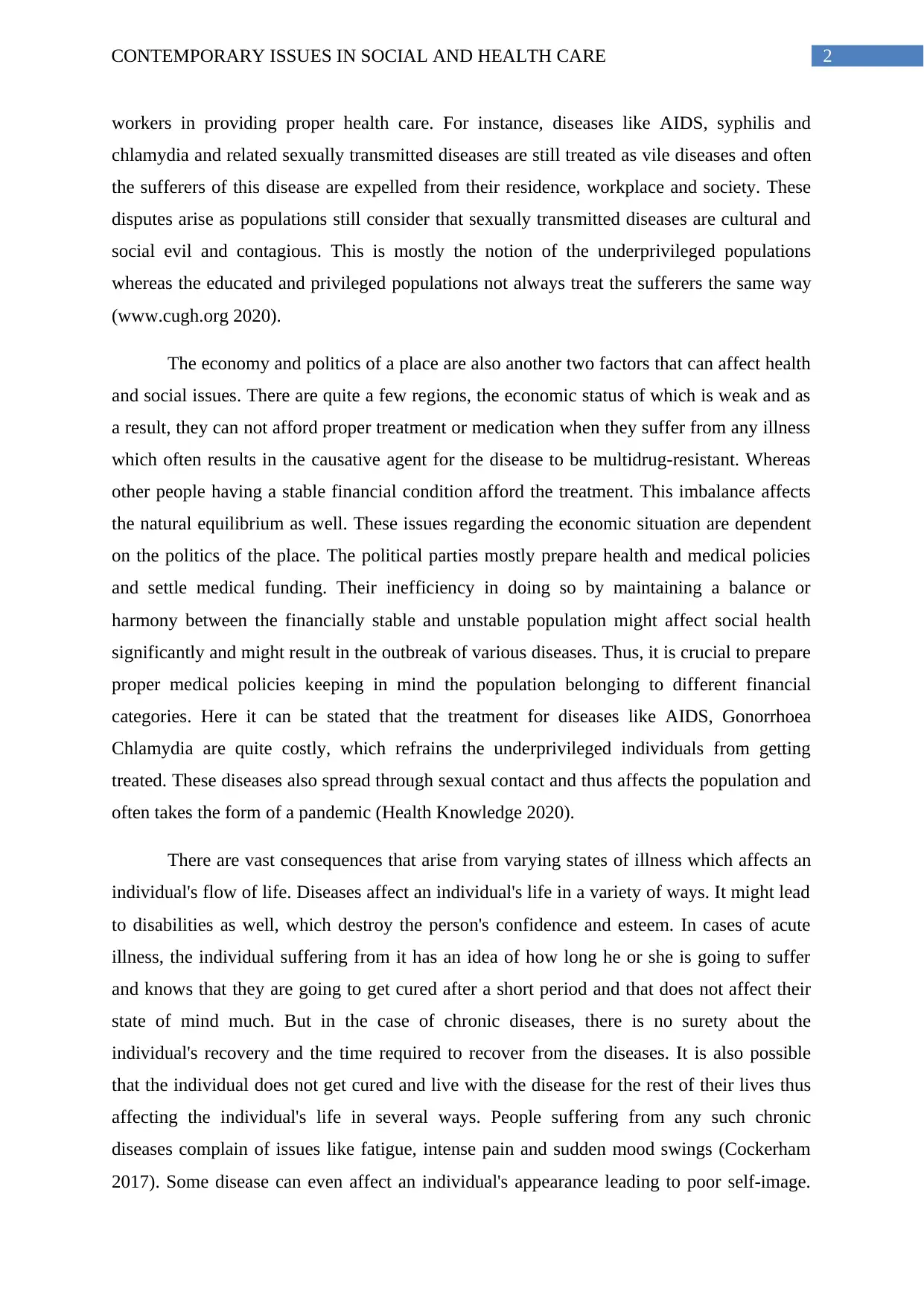
2CONTEMPORARY ISSUES IN SOCIAL AND HEALTH CARE
workers in providing proper health care. For instance, diseases like AIDS, syphilis and
chlamydia and related sexually transmitted diseases are still treated as vile diseases and often
the sufferers of this disease are expelled from their residence, workplace and society. These
disputes arise as populations still consider that sexually transmitted diseases are cultural and
social evil and contagious. This is mostly the notion of the underprivileged populations
whereas the educated and privileged populations not always treat the sufferers the same way
(www.cugh.org 2020).
The economy and politics of a place are also another two factors that can affect health
and social issues. There are quite a few regions, the economic status of which is weak and as
a result, they can not afford proper treatment or medication when they suffer from any illness
which often results in the causative agent for the disease to be multidrug-resistant. Whereas
other people having a stable financial condition afford the treatment. This imbalance affects
the natural equilibrium as well. These issues regarding the economic situation are dependent
on the politics of the place. The political parties mostly prepare health and medical policies
and settle medical funding. Their inefficiency in doing so by maintaining a balance or
harmony between the financially stable and unstable population might affect social health
significantly and might result in the outbreak of various diseases. Thus, it is crucial to prepare
proper medical policies keeping in mind the population belonging to different financial
categories. Here it can be stated that the treatment for diseases like AIDS, Gonorrhoea
Chlamydia are quite costly, which refrains the underprivileged individuals from getting
treated. These diseases also spread through sexual contact and thus affects the population and
often takes the form of a pandemic (Health Knowledge 2020).
There are vast consequences that arise from varying states of illness which affects an
individual's flow of life. Diseases affect an individual's life in a variety of ways. It might lead
to disabilities as well, which destroy the person's confidence and esteem. In cases of acute
illness, the individual suffering from it has an idea of how long he or she is going to suffer
and knows that they are going to get cured after a short period and that does not affect their
state of mind much. But in the case of chronic diseases, there is no surety about the
individual's recovery and the time required to recover from the diseases. It is also possible
that the individual does not get cured and live with the disease for the rest of their lives thus
affecting the individual's life in several ways. People suffering from any such chronic
diseases complain of issues like fatigue, intense pain and sudden mood swings (Cockerham
2017). Some disease can even affect an individual's appearance leading to poor self-image.
workers in providing proper health care. For instance, diseases like AIDS, syphilis and
chlamydia and related sexually transmitted diseases are still treated as vile diseases and often
the sufferers of this disease are expelled from their residence, workplace and society. These
disputes arise as populations still consider that sexually transmitted diseases are cultural and
social evil and contagious. This is mostly the notion of the underprivileged populations
whereas the educated and privileged populations not always treat the sufferers the same way
(www.cugh.org 2020).
The economy and politics of a place are also another two factors that can affect health
and social issues. There are quite a few regions, the economic status of which is weak and as
a result, they can not afford proper treatment or medication when they suffer from any illness
which often results in the causative agent for the disease to be multidrug-resistant. Whereas
other people having a stable financial condition afford the treatment. This imbalance affects
the natural equilibrium as well. These issues regarding the economic situation are dependent
on the politics of the place. The political parties mostly prepare health and medical policies
and settle medical funding. Their inefficiency in doing so by maintaining a balance or
harmony between the financially stable and unstable population might affect social health
significantly and might result in the outbreak of various diseases. Thus, it is crucial to prepare
proper medical policies keeping in mind the population belonging to different financial
categories. Here it can be stated that the treatment for diseases like AIDS, Gonorrhoea
Chlamydia are quite costly, which refrains the underprivileged individuals from getting
treated. These diseases also spread through sexual contact and thus affects the population and
often takes the form of a pandemic (Health Knowledge 2020).
There are vast consequences that arise from varying states of illness which affects an
individual's flow of life. Diseases affect an individual's life in a variety of ways. It might lead
to disabilities as well, which destroy the person's confidence and esteem. In cases of acute
illness, the individual suffering from it has an idea of how long he or she is going to suffer
and knows that they are going to get cured after a short period and that does not affect their
state of mind much. But in the case of chronic diseases, there is no surety about the
individual's recovery and the time required to recover from the diseases. It is also possible
that the individual does not get cured and live with the disease for the rest of their lives thus
affecting the individual's life in several ways. People suffering from any such chronic
diseases complain of issues like fatigue, intense pain and sudden mood swings (Cockerham
2017). Some disease can even affect an individual's appearance leading to poor self-image.
⊘ This is a preview!⊘
Do you want full access?
Subscribe today to unlock all pages.

Trusted by 1+ million students worldwide
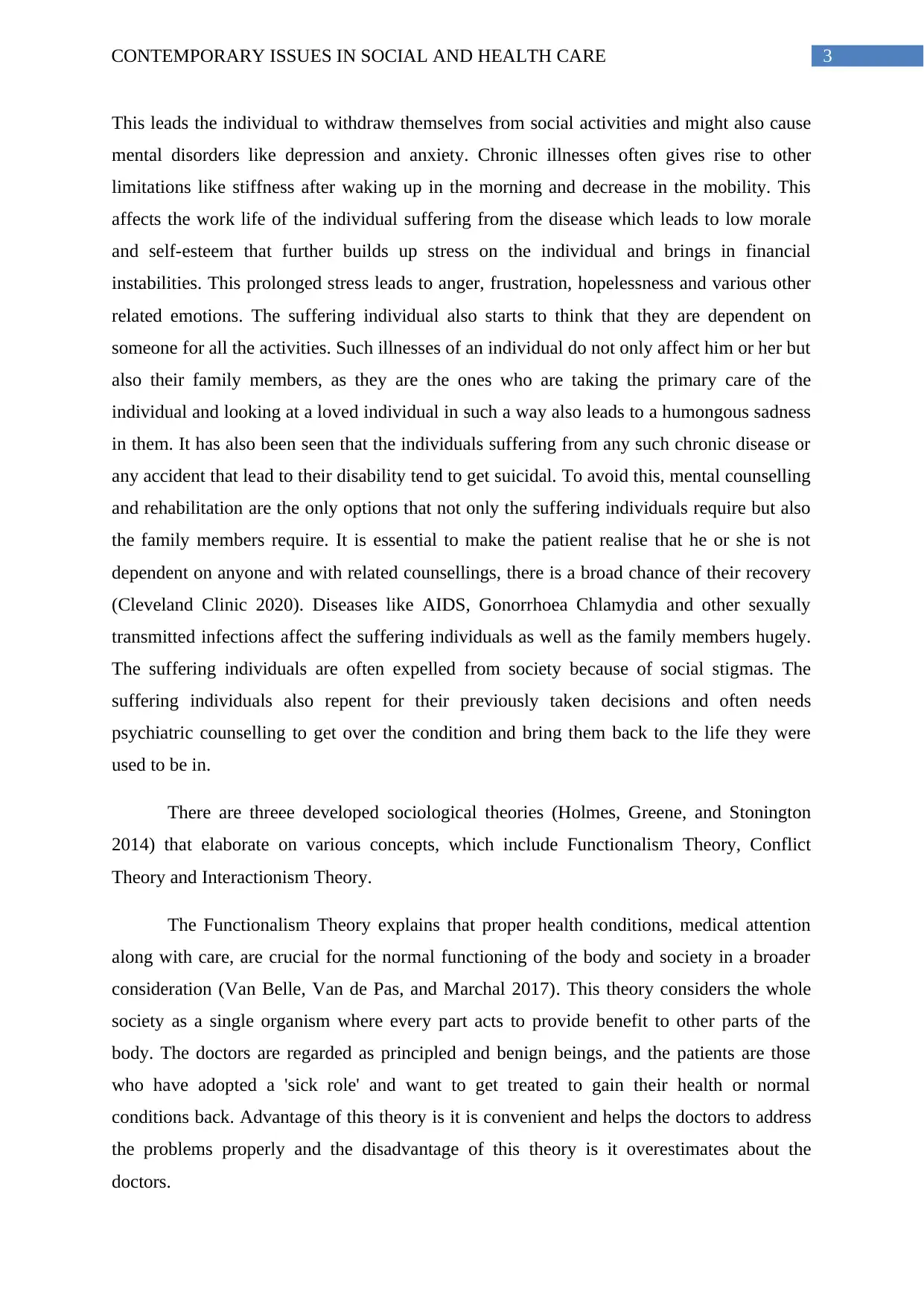
3CONTEMPORARY ISSUES IN SOCIAL AND HEALTH CARE
This leads the individual to withdraw themselves from social activities and might also cause
mental disorders like depression and anxiety. Chronic illnesses often gives rise to other
limitations like stiffness after waking up in the morning and decrease in the mobility. This
affects the work life of the individual suffering from the disease which leads to low morale
and self-esteem that further builds up stress on the individual and brings in financial
instabilities. This prolonged stress leads to anger, frustration, hopelessness and various other
related emotions. The suffering individual also starts to think that they are dependent on
someone for all the activities. Such illnesses of an individual do not only affect him or her but
also their family members, as they are the ones who are taking the primary care of the
individual and looking at a loved individual in such a way also leads to a humongous sadness
in them. It has also been seen that the individuals suffering from any such chronic disease or
any accident that lead to their disability tend to get suicidal. To avoid this, mental counselling
and rehabilitation are the only options that not only the suffering individuals require but also
the family members require. It is essential to make the patient realise that he or she is not
dependent on anyone and with related counsellings, there is a broad chance of their recovery
(Cleveland Clinic 2020). Diseases like AIDS, Gonorrhoea Chlamydia and other sexually
transmitted infections affect the suffering individuals as well as the family members hugely.
The suffering individuals are often expelled from society because of social stigmas. The
suffering individuals also repent for their previously taken decisions and often needs
psychiatric counselling to get over the condition and bring them back to the life they were
used to be in.
There are threee developed sociological theories (Holmes, Greene, and Stonington
2014) that elaborate on various concepts, which include Functionalism Theory, Conflict
Theory and Interactionism Theory.
The Functionalism Theory explains that proper health conditions, medical attention
along with care, are crucial for the normal functioning of the body and society in a broader
consideration (Van Belle, Van de Pas, and Marchal 2017). This theory considers the whole
society as a single organism where every part acts to provide benefit to other parts of the
body. The doctors are regarded as principled and benign beings, and the patients are those
who have adopted a 'sick role' and want to get treated to gain their health or normal
conditions back. Advantage of this theory is it is convenient and helps the doctors to address
the problems properly and the disadvantage of this theory is it overestimates about the
doctors.
This leads the individual to withdraw themselves from social activities and might also cause
mental disorders like depression and anxiety. Chronic illnesses often gives rise to other
limitations like stiffness after waking up in the morning and decrease in the mobility. This
affects the work life of the individual suffering from the disease which leads to low morale
and self-esteem that further builds up stress on the individual and brings in financial
instabilities. This prolonged stress leads to anger, frustration, hopelessness and various other
related emotions. The suffering individual also starts to think that they are dependent on
someone for all the activities. Such illnesses of an individual do not only affect him or her but
also their family members, as they are the ones who are taking the primary care of the
individual and looking at a loved individual in such a way also leads to a humongous sadness
in them. It has also been seen that the individuals suffering from any such chronic disease or
any accident that lead to their disability tend to get suicidal. To avoid this, mental counselling
and rehabilitation are the only options that not only the suffering individuals require but also
the family members require. It is essential to make the patient realise that he or she is not
dependent on anyone and with related counsellings, there is a broad chance of their recovery
(Cleveland Clinic 2020). Diseases like AIDS, Gonorrhoea Chlamydia and other sexually
transmitted infections affect the suffering individuals as well as the family members hugely.
The suffering individuals are often expelled from society because of social stigmas. The
suffering individuals also repent for their previously taken decisions and often needs
psychiatric counselling to get over the condition and bring them back to the life they were
used to be in.
There are threee developed sociological theories (Holmes, Greene, and Stonington
2014) that elaborate on various concepts, which include Functionalism Theory, Conflict
Theory and Interactionism Theory.
The Functionalism Theory explains that proper health conditions, medical attention
along with care, are crucial for the normal functioning of the body and society in a broader
consideration (Van Belle, Van de Pas, and Marchal 2017). This theory considers the whole
society as a single organism where every part acts to provide benefit to other parts of the
body. The doctors are regarded as principled and benign beings, and the patients are those
who have adopted a 'sick role' and want to get treated to gain their health or normal
conditions back. Advantage of this theory is it is convenient and helps the doctors to address
the problems properly and the disadvantage of this theory is it overestimates about the
doctors.
Paraphrase This Document
Need a fresh take? Get an instant paraphrase of this document with our AI Paraphraser
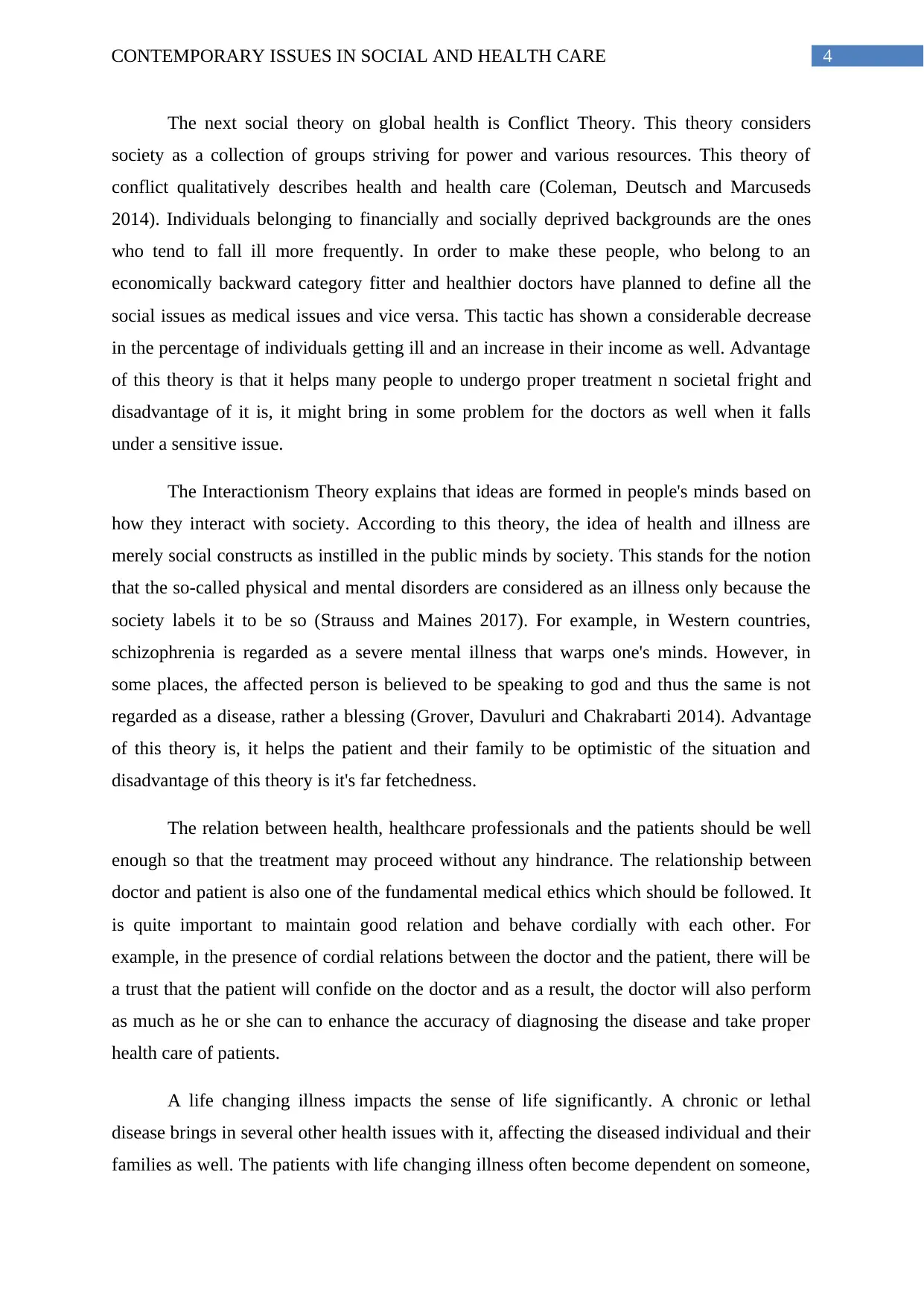
4CONTEMPORARY ISSUES IN SOCIAL AND HEALTH CARE
The next social theory on global health is Conflict Theory. This theory considers
society as a collection of groups striving for power and various resources. This theory of
conflict qualitatively describes health and health care (Coleman, Deutsch and Marcuseds
2014). Individuals belonging to financially and socially deprived backgrounds are the ones
who tend to fall ill more frequently. In order to make these people, who belong to an
economically backward category fitter and healthier doctors have planned to define all the
social issues as medical issues and vice versa. This tactic has shown a considerable decrease
in the percentage of individuals getting ill and an increase in their income as well. Advantage
of this theory is that it helps many people to undergo proper treatment n societal fright and
disadvantage of it is, it might bring in some problem for the doctors as well when it falls
under a sensitive issue.
The Interactionism Theory explains that ideas are formed in people's minds based on
how they interact with society. According to this theory, the idea of health and illness are
merely social constructs as instilled in the public minds by society. This stands for the notion
that the so-called physical and mental disorders are considered as an illness only because the
society labels it to be so (Strauss and Maines 2017). For example, in Western countries,
schizophrenia is regarded as a severe mental illness that warps one's minds. However, in
some places, the affected person is believed to be speaking to god and thus the same is not
regarded as a disease, rather a blessing (Grover, Davuluri and Chakrabarti 2014). Advantage
of this theory is, it helps the patient and their family to be optimistic of the situation and
disadvantage of this theory is it's far fetchedness.
The relation between health, healthcare professionals and the patients should be well
enough so that the treatment may proceed without any hindrance. The relationship between
doctor and patient is also one of the fundamental medical ethics which should be followed. It
is quite important to maintain good relation and behave cordially with each other. For
example, in the presence of cordial relations between the doctor and the patient, there will be
a trust that the patient will confide on the doctor and as a result, the doctor will also perform
as much as he or she can to enhance the accuracy of diagnosing the disease and take proper
health care of patients.
A life changing illness impacts the sense of life significantly. A chronic or lethal
disease brings in several other health issues with it, affecting the diseased individual and their
families as well. The patients with life changing illness often become dependent on someone,
The next social theory on global health is Conflict Theory. This theory considers
society as a collection of groups striving for power and various resources. This theory of
conflict qualitatively describes health and health care (Coleman, Deutsch and Marcuseds
2014). Individuals belonging to financially and socially deprived backgrounds are the ones
who tend to fall ill more frequently. In order to make these people, who belong to an
economically backward category fitter and healthier doctors have planned to define all the
social issues as medical issues and vice versa. This tactic has shown a considerable decrease
in the percentage of individuals getting ill and an increase in their income as well. Advantage
of this theory is that it helps many people to undergo proper treatment n societal fright and
disadvantage of it is, it might bring in some problem for the doctors as well when it falls
under a sensitive issue.
The Interactionism Theory explains that ideas are formed in people's minds based on
how they interact with society. According to this theory, the idea of health and illness are
merely social constructs as instilled in the public minds by society. This stands for the notion
that the so-called physical and mental disorders are considered as an illness only because the
society labels it to be so (Strauss and Maines 2017). For example, in Western countries,
schizophrenia is regarded as a severe mental illness that warps one's minds. However, in
some places, the affected person is believed to be speaking to god and thus the same is not
regarded as a disease, rather a blessing (Grover, Davuluri and Chakrabarti 2014). Advantage
of this theory is, it helps the patient and their family to be optimistic of the situation and
disadvantage of this theory is it's far fetchedness.
The relation between health, healthcare professionals and the patients should be well
enough so that the treatment may proceed without any hindrance. The relationship between
doctor and patient is also one of the fundamental medical ethics which should be followed. It
is quite important to maintain good relation and behave cordially with each other. For
example, in the presence of cordial relations between the doctor and the patient, there will be
a trust that the patient will confide on the doctor and as a result, the doctor will also perform
as much as he or she can to enhance the accuracy of diagnosing the disease and take proper
health care of patients.
A life changing illness impacts the sense of life significantly. A chronic or lethal
disease brings in several other health issues with it, affecting the diseased individual and their
families as well. The patients with life changing illness often become dependent on someone,
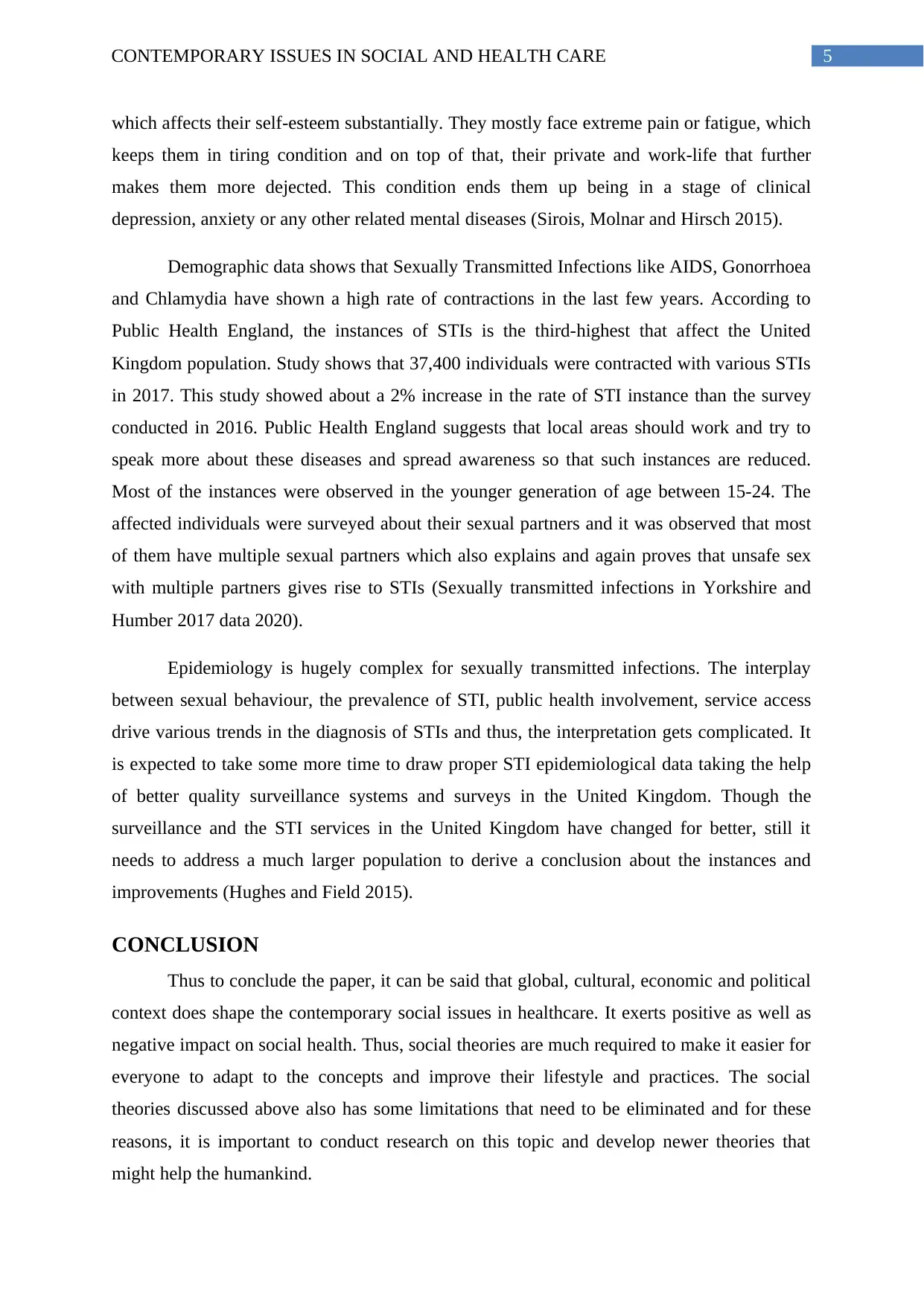
5CONTEMPORARY ISSUES IN SOCIAL AND HEALTH CARE
which affects their self-esteem substantially. They mostly face extreme pain or fatigue, which
keeps them in tiring condition and on top of that, their private and work-life that further
makes them more dejected. This condition ends them up being in a stage of clinical
depression, anxiety or any other related mental diseases (Sirois, Molnar and Hirsch 2015).
Demographic data shows that Sexually Transmitted Infections like AIDS, Gonorrhoea
and Chlamydia have shown a high rate of contractions in the last few years. According to
Public Health England, the instances of STIs is the third-highest that affect the United
Kingdom population. Study shows that 37,400 individuals were contracted with various STIs
in 2017. This study showed about a 2% increase in the rate of STI instance than the survey
conducted in 2016. Public Health England suggests that local areas should work and try to
speak more about these diseases and spread awareness so that such instances are reduced.
Most of the instances were observed in the younger generation of age between 15-24. The
affected individuals were surveyed about their sexual partners and it was observed that most
of them have multiple sexual partners which also explains and again proves that unsafe sex
with multiple partners gives rise to STIs (Sexually transmitted infections in Yorkshire and
Humber 2017 data 2020).
Epidemiology is hugely complex for sexually transmitted infections. The interplay
between sexual behaviour, the prevalence of STI, public health involvement, service access
drive various trends in the diagnosis of STIs and thus, the interpretation gets complicated. It
is expected to take some more time to draw proper STI epidemiological data taking the help
of better quality surveillance systems and surveys in the United Kingdom. Though the
surveillance and the STI services in the United Kingdom have changed for better, still it
needs to address a much larger population to derive a conclusion about the instances and
improvements (Hughes and Field 2015).
CONCLUSION
Thus to conclude the paper, it can be said that global, cultural, economic and political
context does shape the contemporary social issues in healthcare. It exerts positive as well as
negative impact on social health. Thus, social theories are much required to make it easier for
everyone to adapt to the concepts and improve their lifestyle and practices. The social
theories discussed above also has some limitations that need to be eliminated and for these
reasons, it is important to conduct research on this topic and develop newer theories that
might help the humankind.
which affects their self-esteem substantially. They mostly face extreme pain or fatigue, which
keeps them in tiring condition and on top of that, their private and work-life that further
makes them more dejected. This condition ends them up being in a stage of clinical
depression, anxiety or any other related mental diseases (Sirois, Molnar and Hirsch 2015).
Demographic data shows that Sexually Transmitted Infections like AIDS, Gonorrhoea
and Chlamydia have shown a high rate of contractions in the last few years. According to
Public Health England, the instances of STIs is the third-highest that affect the United
Kingdom population. Study shows that 37,400 individuals were contracted with various STIs
in 2017. This study showed about a 2% increase in the rate of STI instance than the survey
conducted in 2016. Public Health England suggests that local areas should work and try to
speak more about these diseases and spread awareness so that such instances are reduced.
Most of the instances were observed in the younger generation of age between 15-24. The
affected individuals were surveyed about their sexual partners and it was observed that most
of them have multiple sexual partners which also explains and again proves that unsafe sex
with multiple partners gives rise to STIs (Sexually transmitted infections in Yorkshire and
Humber 2017 data 2020).
Epidemiology is hugely complex for sexually transmitted infections. The interplay
between sexual behaviour, the prevalence of STI, public health involvement, service access
drive various trends in the diagnosis of STIs and thus, the interpretation gets complicated. It
is expected to take some more time to draw proper STI epidemiological data taking the help
of better quality surveillance systems and surveys in the United Kingdom. Though the
surveillance and the STI services in the United Kingdom have changed for better, still it
needs to address a much larger population to derive a conclusion about the instances and
improvements (Hughes and Field 2015).
CONCLUSION
Thus to conclude the paper, it can be said that global, cultural, economic and political
context does shape the contemporary social issues in healthcare. It exerts positive as well as
negative impact on social health. Thus, social theories are much required to make it easier for
everyone to adapt to the concepts and improve their lifestyle and practices. The social
theories discussed above also has some limitations that need to be eliminated and for these
reasons, it is important to conduct research on this topic and develop newer theories that
might help the humankind.
⊘ This is a preview!⊘
Do you want full access?
Subscribe today to unlock all pages.

Trusted by 1+ million students worldwide
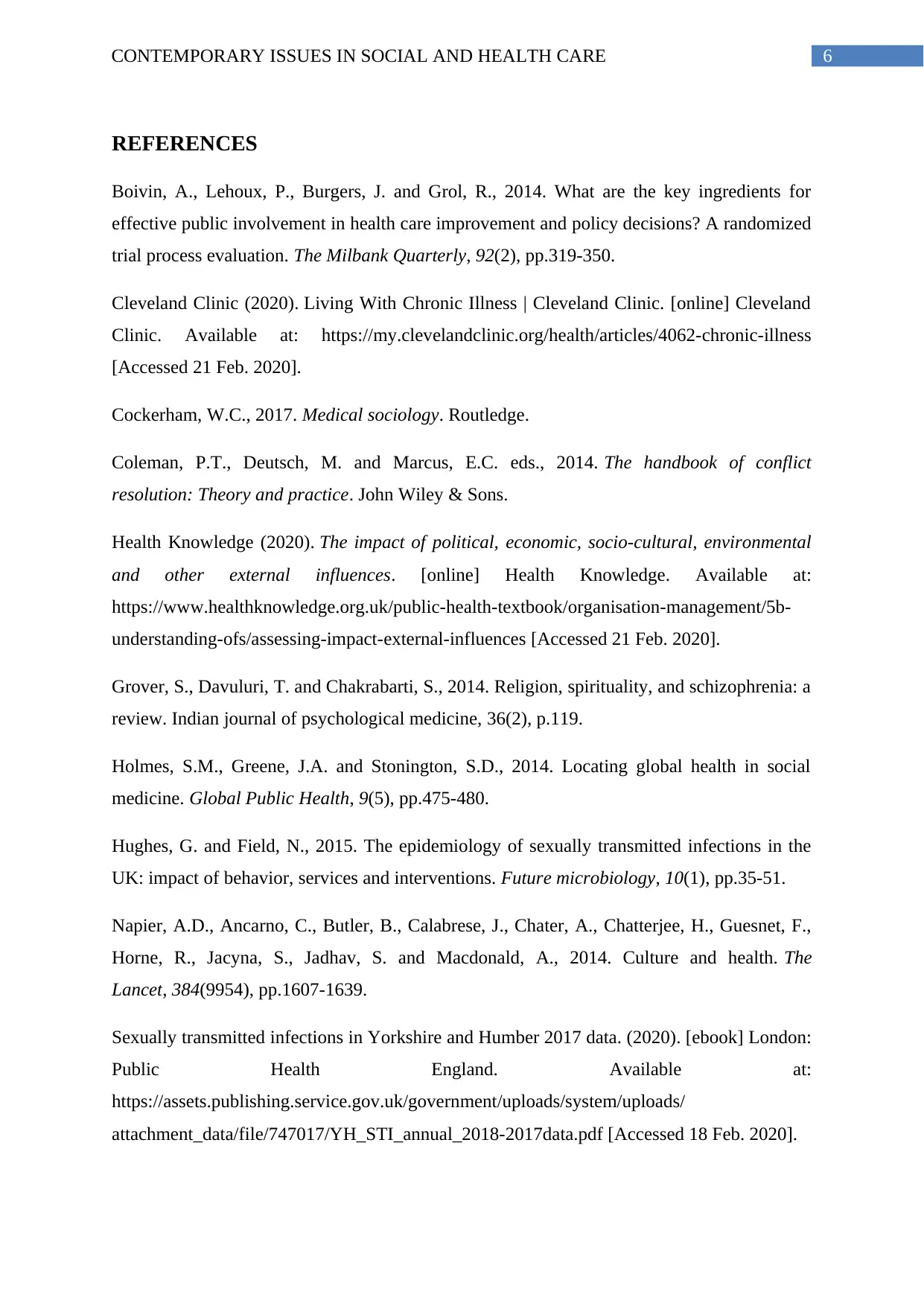
6CONTEMPORARY ISSUES IN SOCIAL AND HEALTH CARE
REFERENCES
Boivin, A., Lehoux, P., Burgers, J. and Grol, R., 2014. What are the key ingredients for
effective public involvement in health care improvement and policy decisions? A randomized
trial process evaluation. The Milbank Quarterly, 92(2), pp.319-350.
Cleveland Clinic (2020). Living With Chronic Illness | Cleveland Clinic. [online] Cleveland
Clinic. Available at: https://my.clevelandclinic.org/health/articles/4062-chronic-illness
[Accessed 21 Feb. 2020].
Cockerham, W.C., 2017. Medical sociology. Routledge.
Coleman, P.T., Deutsch, M. and Marcus, E.C. eds., 2014. The handbook of conflict
resolution: Theory and practice. John Wiley & Sons.
Health Knowledge (2020). The impact of political, economic, socio-cultural, environmental
and other external influences. [online] Health Knowledge. Available at:
https://www.healthknowledge.org.uk/public-health-textbook/organisation-management/5b-
understanding-ofs/assessing-impact-external-influences [Accessed 21 Feb. 2020].
Grover, S., Davuluri, T. and Chakrabarti, S., 2014. Religion, spirituality, and schizophrenia: a
review. Indian journal of psychological medicine, 36(2), p.119.
Holmes, S.M., Greene, J.A. and Stonington, S.D., 2014. Locating global health in social
medicine. Global Public Health, 9(5), pp.475-480.
Hughes, G. and Field, N., 2015. The epidemiology of sexually transmitted infections in the
UK: impact of behavior, services and interventions. Future microbiology, 10(1), pp.35-51.
Napier, A.D., Ancarno, C., Butler, B., Calabrese, J., Chater, A., Chatterjee, H., Guesnet, F.,
Horne, R., Jacyna, S., Jadhav, S. and Macdonald, A., 2014. Culture and health. The
Lancet, 384(9954), pp.1607-1639.
Sexually transmitted infections in Yorkshire and Humber 2017 data. (2020). [ebook] London:
Public Health England. Available at:
https://assets.publishing.service.gov.uk/government/uploads/system/uploads/
attachment_data/file/747017/YH_STI_annual_2018-2017data.pdf [Accessed 18 Feb. 2020].
REFERENCES
Boivin, A., Lehoux, P., Burgers, J. and Grol, R., 2014. What are the key ingredients for
effective public involvement in health care improvement and policy decisions? A randomized
trial process evaluation. The Milbank Quarterly, 92(2), pp.319-350.
Cleveland Clinic (2020). Living With Chronic Illness | Cleveland Clinic. [online] Cleveland
Clinic. Available at: https://my.clevelandclinic.org/health/articles/4062-chronic-illness
[Accessed 21 Feb. 2020].
Cockerham, W.C., 2017. Medical sociology. Routledge.
Coleman, P.T., Deutsch, M. and Marcus, E.C. eds., 2014. The handbook of conflict
resolution: Theory and practice. John Wiley & Sons.
Health Knowledge (2020). The impact of political, economic, socio-cultural, environmental
and other external influences. [online] Health Knowledge. Available at:
https://www.healthknowledge.org.uk/public-health-textbook/organisation-management/5b-
understanding-ofs/assessing-impact-external-influences [Accessed 21 Feb. 2020].
Grover, S., Davuluri, T. and Chakrabarti, S., 2014. Religion, spirituality, and schizophrenia: a
review. Indian journal of psychological medicine, 36(2), p.119.
Holmes, S.M., Greene, J.A. and Stonington, S.D., 2014. Locating global health in social
medicine. Global Public Health, 9(5), pp.475-480.
Hughes, G. and Field, N., 2015. The epidemiology of sexually transmitted infections in the
UK: impact of behavior, services and interventions. Future microbiology, 10(1), pp.35-51.
Napier, A.D., Ancarno, C., Butler, B., Calabrese, J., Chater, A., Chatterjee, H., Guesnet, F.,
Horne, R., Jacyna, S., Jadhav, S. and Macdonald, A., 2014. Culture and health. The
Lancet, 384(9954), pp.1607-1639.
Sexually transmitted infections in Yorkshire and Humber 2017 data. (2020). [ebook] London:
Public Health England. Available at:
https://assets.publishing.service.gov.uk/government/uploads/system/uploads/
attachment_data/file/747017/YH_STI_annual_2018-2017data.pdf [Accessed 18 Feb. 2020].
Paraphrase This Document
Need a fresh take? Get an instant paraphrase of this document with our AI Paraphraser
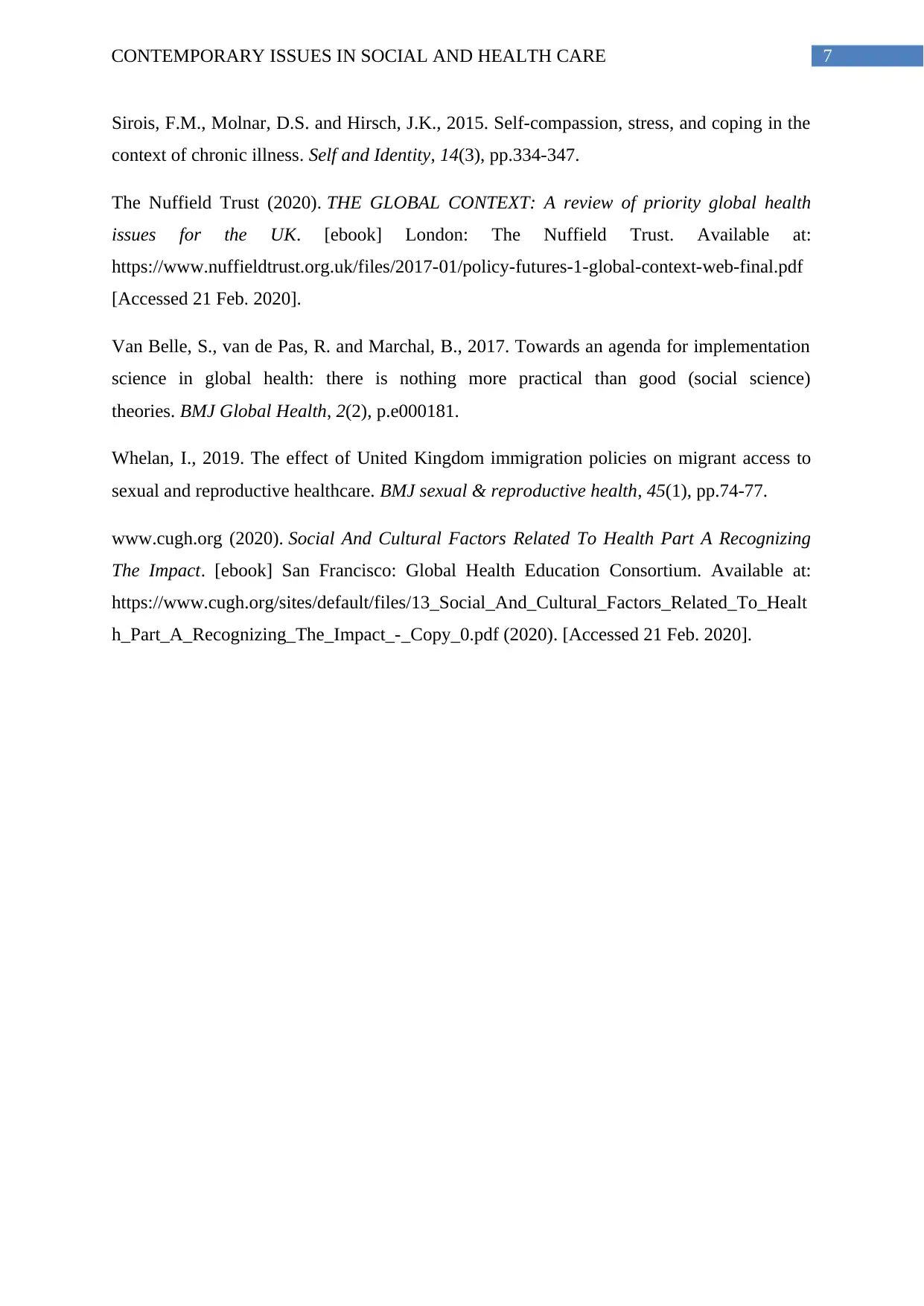
7CONTEMPORARY ISSUES IN SOCIAL AND HEALTH CARE
Sirois, F.M., Molnar, D.S. and Hirsch, J.K., 2015. Self-compassion, stress, and coping in the
context of chronic illness. Self and Identity, 14(3), pp.334-347.
The Nuffield Trust (2020). THE GLOBAL CONTEXT: A review of priority global health
issues for the UK. [ebook] London: The Nuffield Trust. Available at:
https://www.nuffieldtrust.org.uk/files/2017-01/policy-futures-1-global-context-web-final.pdf
[Accessed 21 Feb. 2020].
Van Belle, S., van de Pas, R. and Marchal, B., 2017. Towards an agenda for implementation
science in global health: there is nothing more practical than good (social science)
theories. BMJ Global Health, 2(2), p.e000181.
Whelan, I., 2019. The effect of United Kingdom immigration policies on migrant access to
sexual and reproductive healthcare. BMJ sexual & reproductive health, 45(1), pp.74-77.
www.cugh.org (2020). Social And Cultural Factors Related To Health Part A Recognizing
The Impact. [ebook] San Francisco: Global Health Education Consortium. Available at:
https://www.cugh.org/sites/default/files/13_Social_And_Cultural_Factors_Related_To_Healt
h_Part_A_Recognizing_The_Impact_-_Copy_0.pdf (2020). [Accessed 21 Feb. 2020].
Sirois, F.M., Molnar, D.S. and Hirsch, J.K., 2015. Self-compassion, stress, and coping in the
context of chronic illness. Self and Identity, 14(3), pp.334-347.
The Nuffield Trust (2020). THE GLOBAL CONTEXT: A review of priority global health
issues for the UK. [ebook] London: The Nuffield Trust. Available at:
https://www.nuffieldtrust.org.uk/files/2017-01/policy-futures-1-global-context-web-final.pdf
[Accessed 21 Feb. 2020].
Van Belle, S., van de Pas, R. and Marchal, B., 2017. Towards an agenda for implementation
science in global health: there is nothing more practical than good (social science)
theories. BMJ Global Health, 2(2), p.e000181.
Whelan, I., 2019. The effect of United Kingdom immigration policies on migrant access to
sexual and reproductive healthcare. BMJ sexual & reproductive health, 45(1), pp.74-77.
www.cugh.org (2020). Social And Cultural Factors Related To Health Part A Recognizing
The Impact. [ebook] San Francisco: Global Health Education Consortium. Available at:
https://www.cugh.org/sites/default/files/13_Social_And_Cultural_Factors_Related_To_Healt
h_Part_A_Recognizing_The_Impact_-_Copy_0.pdf (2020). [Accessed 21 Feb. 2020].
1 out of 8
Related Documents
Your All-in-One AI-Powered Toolkit for Academic Success.
+13062052269
info@desklib.com
Available 24*7 on WhatsApp / Email
![[object Object]](/_next/static/media/star-bottom.7253800d.svg)
Unlock your academic potential
Copyright © 2020–2025 A2Z Services. All Rights Reserved. Developed and managed by ZUCOL.





